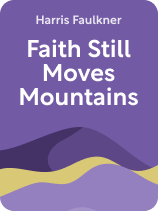

This article is an excerpt from the Shortform book guide to "Faith Still Moves Mountains" by Harris Faulkner. Shortform has the world's best summaries and analyses of books you should be reading.
Like this article? Sign up for a free trial here.
How do some people survive seemingly impossible situations? What role does faith play in finding purpose and direction in life?
In Faith Still Moves Mountains, Harris Faulkner explores stories of God’s intervention in people’s lives. The book recounts miraculous rescues and divine inspirations that have saved lives and provided guidance to those feeling lost.
Keep reading to discover how faith can transform lives in unexpected ways.
God’s Intervention
In her book, Faulkner shares stirring examples of God’s intervention. She describes God saving people in two ways:
- God literally saves someone from death or serious danger.
- God figuratively saves someone who’s lost by providing them with purpose or direction.
#1: God Provides Safety
Faulkner explains that God can intervene to save people from death. Some of her stories involve incredible rescues from danger that were only possible because of a series of elaborate “coincidences” that were actually the work of God. Other stories explain how God answered prayers to heal the sick when conventional medicine failed.
For example, Earnestine Reese’s home was almost entirely destroyed by a tornado—the only thing left standing was her prayer closet. Earnestine was in the bathroom during the storm and was buried under rubble, but she and her children survived. Earnestine attributes the miraculous survival of both herself and her prayer closet to the power of God at work.
(Shortform note: Some Christian clergy explain that faith healing and divine rescues aren’t a matter of faith and prayer “causing” health and safety—praying hard doesn’t guarantee your physical body will be saved by God, and even those without faith can be saved by him. The only thing that determines why someone like Earnestine was rescued while others were not is God’s plan, which is unknowable to us. But while faith and prayer won’t always save your physical body, the clergy explain, they can still save or heal your soul by granting you a spot in Heaven.)
#2: God Provides Direction
In addition, Faulkner describes how God can provide direction to those who feel lost or out of options due to depression, grief, trauma, or some other obstacle. Sometimes he does this directly, speaking to a person or giving them an idea or gut intuition. Other times, faith in God indirectly provides people with purpose—by inspiring them to become clergy or missionaries or to dedicate themselves to worship and charity in some other way.
(Shortform note: Og Mandino (The Greatest Salesman in the World) argues that looking to God for direction isn’t just for the lost or desperate—it’s for everyone. He suggests that even the most successful people need guidance from God once in a while. By praying to him for help, you can remind yourself to stay humble and recognize when you don’t have the answers to your problems.)
For example, Faulkner recounts the story of Sarah Olson and her medical device company Levity Products. Olson’s son Levi had to use a catheter because of a medical condition, but conventional catheters caused him intense pain and discomfort. Feeling lost and out of options, Olson prayed for a solution—and suddenly received divine inspiration for a new and improved catheter design. She used this design to help ease her child’s pain and also founded a company to sell it to other people in need. This provided her with a new purpose in life.
(Shortform note: Olson’s story of divine inspiration is part of a long tradition connecting creativity and God. For much of human history, people assumed creativity was a trait reserved for God (or the gods, depending on the religion). They believed that creative acts like making art or music meant God was speaking through the artist—not that the artist was coming up with their own ideas. While modern views on creativity tend to be less cut and dried, Sarah Olson’s story of receiving her idea from God fits in with this more traditional perspective.)
Exercise: Reflect on the Role of Faith and God in Your Life
Consider how God and faith have impacted, or might impact, your life in a positive way.
- Describe a moment when you needed guidance or rescue. How did your faith help you through this situation?
- If God and faith are not part of your life, why have you chosen this path? What, if anything, might prompt you to change it?

———End of Preview———
Like what you just read? Read the rest of the world's best book summary and analysis of Harris Faulkner's "Faith Still Moves Mountains" at Shortform.
Here's what you'll find in our full Faith Still Moves Mountains summary:
- Real-life stories about how God responds to prayer and faith
- How faith can impact people’s lives in miraculous ways
- Why God still matters in our modern, more secular world






